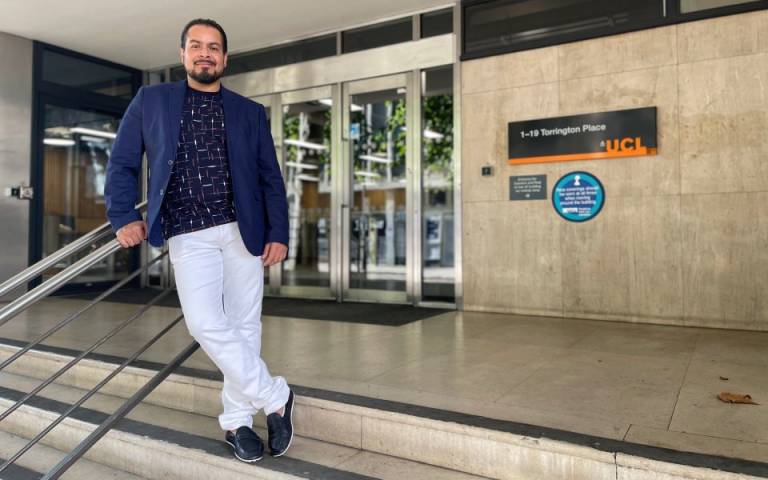Dr Omar Rivasplata
Dr Omar Rivasplata is an Institute for Mathematical and Statistical Sciences (IMSS) Senior Research Fellow at the Department of Statistical Science

4 September 2022
When did you take up this position? What was your position beforehand?
I started my role at the Department of Statistical Science in February 2022. Before that, for a few months I was at the Department of Mathematics as an EPSRC Research Associate, and before that for a few years I was at the Department of Computer Science doing research studies in Statistical Learning, sponsored by DeepMind, and in parallel with these research studies I was affiliated with DeepMind as a Research Science Intern.
When did you join UCL and where were you before?
I joined UCL in November 2017. Before that I was at the University of Alberta (Edmonton, Canada). Many times, I visited the Banff International Research Station, where events and workshops in mathematical sciences take place throughout the year. Eventually, after being a lecturer for maths and stats courses over several years, I discovered machine learning and decided to redirect my career into this fascinating field, which brought me to the UK and UCL.
Tell us about your work at UCL - how do you spend your days, and what makes your role different to similar positions elsewhere?
I am loving my role because in it I am developing as an independent researcher. I organise a series of invited talks known as the "DELTA talks" after the name of my research group "DELTA" (which stands for "Data, Environments, and Learners: Theory and Algorithms"). These talks are advertised in the media (Twitter, LinkedIn) to amplify visibility, and feature invited speakers who tell us about statistics and machine learning topics.
One of the most exciting things about my role is being related to the Institute for Mathematical and Statistical Sciences (IMSS) and so my activities are aimed at shaping the institute's future and helping to make the collocation of the two departments a nice reality. We look forward to having our own dedicated facility!
Please follow IMSS on Twitter and Facebook!
On an average day I have virtual meetings with my collaborators, I organise my activities, I read/digest technical papers related to my research, and I write down notes/thoughts that eventually make their way into my papers when the research results are ready for publication.
What are some of your favourite things about working in the department? How have you found it different to previous jobs?
My favourite things about working in the Department of Statistical Science are, hands down, the vibrant research culture (plenty of talent here!) and the positive atmosphere.
I think many workplaces, university departments included, try to foster a culture that encourages everyone to excel, besides encouraging cultures of respect and collegiality. But here at UCL Statistical Science I have found the freedom to work as an independent researcher.
I feel fortunate for this find and I intend to make the most of it!
Can you tell us about any upcoming research, or future projects that you're looking forward to working on?
This one requires a bit of technical language. I work on optimisation and certification strategies for machine learning algorithms.
A recent project of mine explored these kinds of strategies for deep learning classifiers; this work is the content of my paper Tighter Risk Certificates for Neural Networks which was published by the Journal of Machine Learning Research and is freely available on the publisher's website.
Classification tasks are the domain of "supervised learning" where the available data consist of labelled examples (e.g., digital pictures of animals together with the correct labels "dog" and "cat" etc.).
The project was very exciting because its results showed classification error certificates that were very close to the classifiers' observed error rates on fresh data points, whereas previous attempts to produce such certificates had been nowhere near the observed performance.
Currently I am working on problem settings where only a limited number of data points contain label information; and developing new learning algorithms for these kinds of settings.
For future projects I look forward to working on other machine learning paradigms including reinforcement learning and developing intelligent systems that can assist people in solving challenging problems.
Have you always been based in London? If not, when did you move here, and how did you find adapting to living in London?
Upon my arrival to the UK in November 2017, I right away settled in St Albans. Since last November I have lived in Hemel Hempstead, also in Hertfordshire.
I like the small-town lifestyle, with easy access to parks and open areas. There are plenty of woods and trails around where one can go to stretch the legs on a walk while admiring the surrounding views.
Finally, tell us about your non-work life. Do you have any hobbies, or favourite places to go in London?
I am into wall-climbing. It is a nice mix of physical activity and puzzle-solving. On some evenings and weekends, I can be found at The XC doing rope climbing and bouldering with friends. A couple of times I've been to the Peak District and have done real rock climbs there.
I like movies of many kinds. During the pandemic, I watched many movies indeed!
Before the pandemic I was a regular at social dance events (Bachata, Merengue, Cuban Salsa, Kizomba and Semba). Nowadays on some Thursday evenings I can be found at the TCR Bar enjoying an end-of-day pint with colleagues and friends.
 Close
Close

